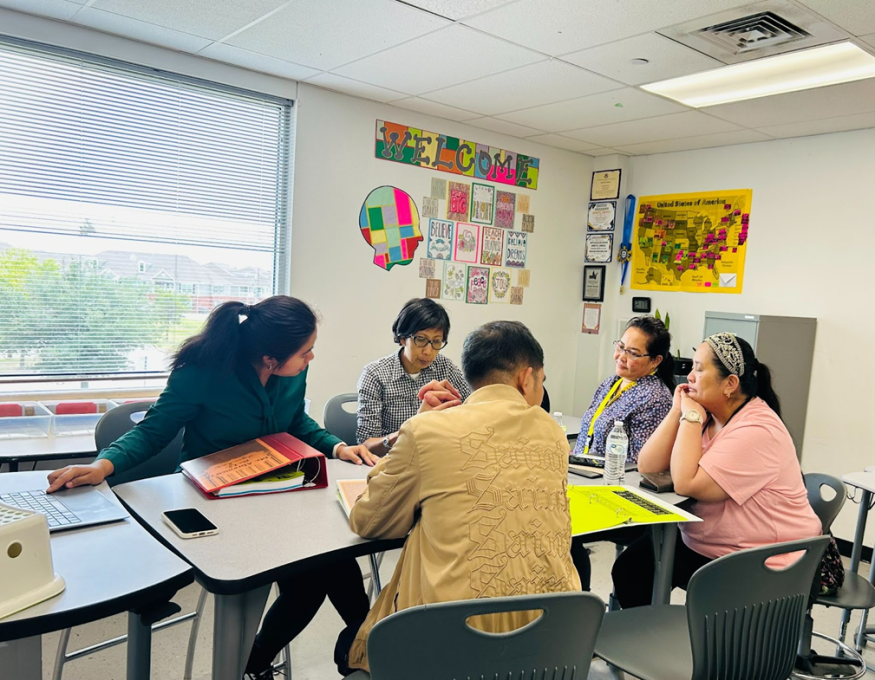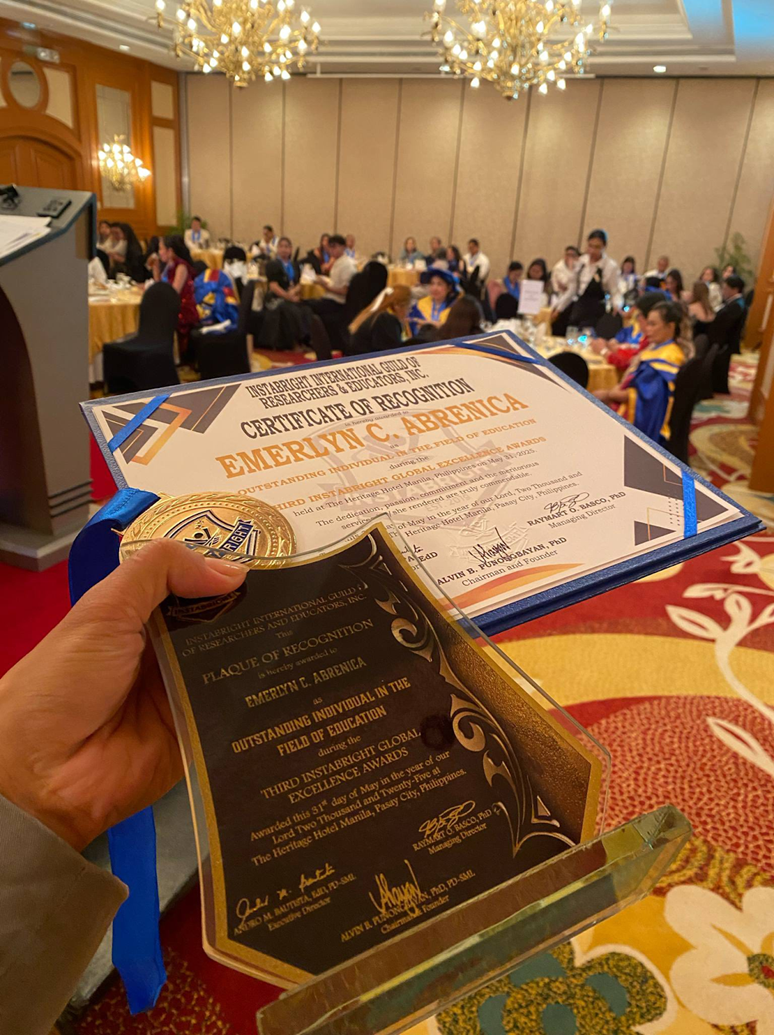
In a busy middle school classroom in the Austin Metropolitan area, a math teacher toggled between reviewing student data, mentoring fellow educators, and prepping for a UIL coaching session. While others focused on the lesson of the day, she was also thinking about systems, strategy, and student confidence.
That educator is Emerlyn Abrenica, a department head, coach, certified multi-state teacher, and lifelong learner. Her work sits at the intersection of classroom instruction, leadership development, and research-backed practice.
For her, teaching math is just the beginning. Leading in education means being deeply invested in people, progress, and the power of possibility.
From the Philippines to Texas: A Cross-Cultural Calling
Emerlyn began her teaching career in the Philippines, where she served in middle and senior high schools.
Inspired by a high school teacher and her own experience as a math competitor, she pursued a career in education to help students see math as a path to opportunity.
After earning a degree in Secondary Education (Mathematics) from the National Teachers College in Manila, she developed a strong, student-centered teaching approach.
Building on her years of teaching in the Philippines, she moved to the U.S. under a Visiting International Teacher certificate and now serves as Math Department Head and middle school teacher at Decker Middle School in the Manor Independent School District.
Merging Research and Practice: A Data-Driven Approach
While teaching full-time, Emerlyn pursued graduate studies and earned a Master of Arts in Education, major in Educational Leadership and Management, from the University of the Visayas. Her research, "Social Persuasion: A Strategy for Optimizing Students' Self-Efficacy and Mathematics Performance," explored the link between motivation and achievement in mathematics, aligning with findings from Bandura (1997) on self-efficacy and student learning.
Rather than letting her thesis sit on a shelf, Emerlyn integrated its findings into her classroom. She designed lesson plans and coaching models that combined academic rigor with mindset development, helping students build resilience alongside skills.
"Her approach is rooted in data. She doesn't just monitor performance; she utilizes analytics to pinpoint learning gaps, design targeted interventions, and offer coaching to teachers," says Mr. Joshua Duty, former principal of Decker Middle School.
With certifications in Texas, New Mexico, and Illinois, Emerlyn brings instructional leadership that adapts across diverse educational systems.
Leading by Example: Departmental and Instructional Leadership
In her current role at Decker Middle School, Emerlyn's leadership extends beyond her own classroom. She coordinates curriculum planning, facilitates data meetings, mentors new educators, and ensures instructional alignment with Texas standards and district goals.

Her work reflects a deep belief: "student success is a team effort."
By mentoring colleagues and modeling best practices, she helps elevate instruction across the campus. According to Ms. Tara Hinton, assistant principal at Manor Independent School District, "Emerlyn's leadership combines deep content knowledge with a focus on professional growth for her colleagues."
Her instructional strategies align with the National Council of Teachers of Mathematics (NCTM, 2014) standards, emphasizing problem-solving, reasoning, and the use of multiple representations. She also incorporates culturally responsive teaching strategies consistent with Hammond (2015), connecting mathematics to students' identities and experiences to improve engagement and equity.
From Competitor to Coach: Empowering Through UIL
Emerlyn's early passion for math competitions came full circle when she began coaching University Interscholastic League (UIL) teams. For two consecutive seasons, she led after-school training in Mathematics and Number Sense, helping students refine their problem-solving strategies and develop competitive focus. Her approach reflects principles from Schoenfeld (2016) regarding mathematical problem-solving and metacognitive skill development.

In Spring, her students earned recognition at Bastrop Middle School—a proud moment that validated her coaching approach as a blend of technical preparation and belief-building.
Recognized at Every Level: Local, National, and International Impact
Emerlyn's commitment to student growth and instructional excellence has earned her recognition across campus, nationally, and internationally. She was named Teacher of the Month for her consistent impact in the classroom and unwavering dedication to student achievement.
As a rising leader in her district, she was honored as a Teacher of Promise. This recognition reflects her early-career performance and her strength across all key domains of the Texas Teacher Evaluation and Support System (T-TESS), including planning and instruction, classroom environment, and professional responsibilities.
Her influence extends beyond her own classroom. This year, she received the Teacher Leader Impact Award from Edthena, a national honor recognizing her meaningful contributions to professional learning and educator development.
Internationally, Emerlyn was celebrated as Outstanding Educator of the Year at the Instabright International Conference in Singapore, a recognition of her global perspective and leadership in education. That same year, she was named Outstanding Individual in the Field of Education at the Instabright Global Excellence Awards in the Philippines, highlighting her ongoing commitment to innovation, mentorship, and research-informed practice.
Beyond the Classroom: Writing, Reflection, and Healing
Emerlyn's impact extended into the literary world when she received three Instabright Literary Awards for her creative story and poems in English and Filipino.
Her winning entries, Harvest of Grace, Where Words Build Bridges, and Sa Wikang Bumibigkis—reflect a personal philosophy: that storytelling, like teaching, can heal, connect, and inspire, demonstrating her belief that storytelling fosters connection, reflection, and personal growth—an approach aligned with culturally responsive pedagogy (Gay, 2010).
A Vision for Transformational Leadership
Emerlyn remains deeply engaged in the professional education community through memberships in AMTE, NCTM, and TCTM. These organizations focus on improving mathematics teaching and teacher development, keeping her connected to evolving best practices, national dialogue, and innovation in math education from Pre-K through grade 12.
Looking ahead, Emerlyn aspires to scale her leadership by taking on more impactful roles at the district level, where she can influence curriculum development, mentor fellow educators, and foster professional learning communities that support continuous instructional growth. Her leadership approach reflects the recommendations of Darling-Hammond et al. (2017), who emphasize that instructional leaders should combine research, mentorship, and data-informed practice to improve student outcomes.

She also seeks to contribute to the broader education landscape through educational research, policy advocacy, and equity-centered reforms in mathematics instruction. By combining research-based strategies with cross-cultural experience, Emerlyn aims to reshape math instruction across diverse settings and empower students and teachers to thrive in a complex, data-driven world.
Mr. Duty stressed, "Emerlyn's research-based approach and cross-cultural experience position her as a transformational leader in mathematics education." Her work emphasizes equity, rigor, and confidence-building for all students, ensuring access to high-quality mathematics instruction.
A Class of Her Own
What sets Emerlyn Abrenica apart is her cross-cultural teaching experience, spanning classrooms in the Philippines and the United States, and strengthened by international recognition for her leadership and innovation in education.
Her journey reflects a belief that mathematics, combined with research-driven mentorship, can empower students with the confidence and skills to succeed throughout their lives.
References
- Bandura, A. (1997). Self-efficacy: The exercise of control. W.H. Freeman.
- Darling-Hammond, L., Hyler, M.E., & Gardner, M. (2017). Effective teacher professional development. Palo Alto, CA: Learning Policy Institute.
- Gay, G. (2010). Culturally responsive teaching: Theory, research, and practice. Teachers College Press.
- Hammond, Z. (2015). Culturally responsive teaching and the brain. Corwin Press.
- National Council of Teachers of Mathematics (NCTM). (2014). Principles to actions: Ensuring mathematical success for all. NCTM.
- Schoenfeld, A.H. (2016). Mathematical problem solving. Academic Press.
About the Author
Marisol Vega is an education journalist based in Oakland, California. With a background in curriculum development and over a decade covering public schools, she focuses on stories that spotlight innovative teaching and cross-cultural leadership. Her work has appeared in leading education publications, highlighting research-informed strategies and systemic improvements in schools.
© 2026 ScienceTimes.com All rights reserved. Do not reproduce without permission. The window to the world of Science Times.













